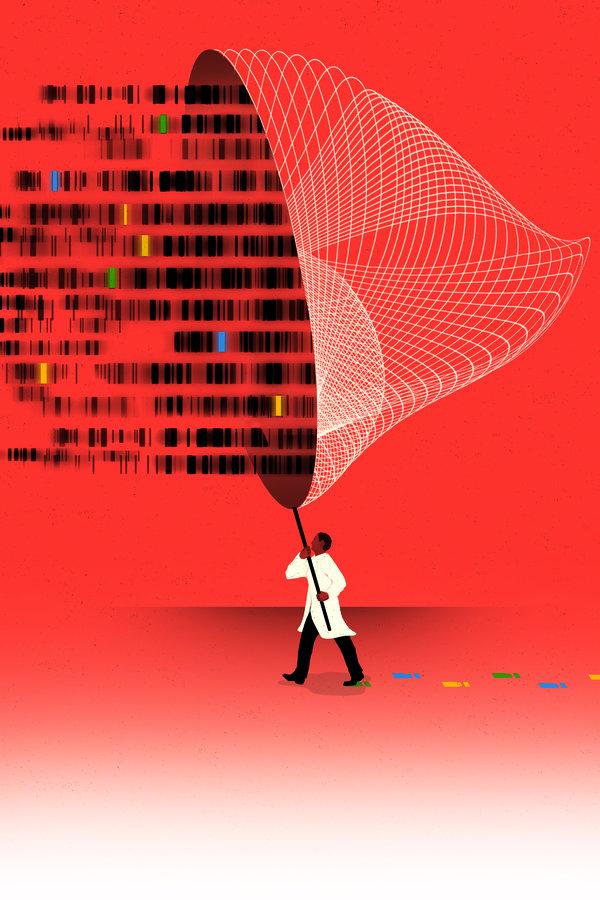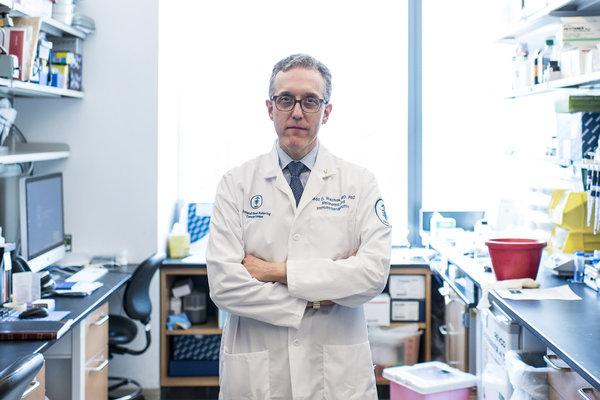The Results of Your Genetic Test Are Reassuring. But That Can Change.
Laboratories frequently “reclassify” genetic mutations. But there is no reliable system for telling patients or doctors that the results of their genetic tests are no longer valid.
By Gina Kolata

The results of a genetic test may seem final — after all, a gene mutation is present or it is not. That mutation increases the risk of a disease, or it does not.
In fact, those findings are not as straightforward as they might seem, and the consequences may have grave implications for patients.
While a person’s genome doesn’t change, the research linking particular bits of DNA to disease is very much in flux. Geneticists and testing labs constantly receive new information that leads them to reassess genetic mutations.
As a result, a mutation seen as benign today may be found dangerous tomorrow. And vice versa. But there is no good way to get the new information to doctors and patients.
The result: The gene test you had a few years ago might yield a startlingly different result now.
The problem affects a minority of patients, mostly people with unusual mutations. The more common disease-causing mutations — like those that predispose you to breast or colon cancer — are so well studied that their meaning is not in doubt.
In a recent study, researchers at Myriad Genetics, a diagnostic company, reviewed data on 1.45 million patients who had genetic tests from 2006 to 2016 to see if the results originally reported still held true.
The lab issued new reports for nearly 60,000 of them, meaning the old results had been superseded by new data.
But many patients who carry mutations that have been reclassified remain in the dark. “The system is completely chaotic,” said Dr. Sharon E. Plon, a clinical geneticist at Baylor College of Medicine.
There is no systematic way, she said, to tell patients and doctors that a mutation once thought harmless has been shown to be a health hazard or one thought dangerous is actually benign.
“Some labs report out only one-time results,” said Dr. Theodora Ross, director of the cancer genetics program at the University of Texas Southwestern Medical Center. “They are not going back to reassess test interpretations from ten years ago unless doctors ask.”
But doctors seldom ask, she added.
[Like the Science Times page on Facebook. | Sign up for the Science Times newsletter.]
Normally, a doctor orders genetic testing for a person with a strong family history of, say, heart attacks, strokes or cancer. A sample of a patient’s blood or saliva is sent to a lab, where the patient’s DNA is scanned for unusual alterations.
Not all of these are harmful. The lab compares the mutations to those shown in scientific studies to cause disease.
Some patients are told they have a mutation that is meaningless. Others learn they have “a variation of unknown significance” in a suspect gene — meaning no one knows quite what to make of it.
Still other patients have a mutation deemed dangerous, meaning there is a very high risk of developing cancer, heart disease or another condition. For those patients, such a result can mean regular monitoring and can alter a number of life decisions, including whether to have children.
Reclassification is a particular problem for members of racial and ethnic minorities —- populations whose genes have not been as well studied as those of white people. It can be difficult to know what a variation in DNA means for these patients.
A federally-supported database, ClinVar, allows laboratories to publicly share data on genetic mutations and what they are thought to mean. But some companies, like Myriad, which host huge databases on genetic mutations, do not contribute to ClinVar.
Even the terminology for DNA variants may not be widely shared. Different labs have different naming schemes.
For example, ClinVar renders one DNA variant this way:
NM_004004.5(GJB2):c.101T>C (p.Met34Thr).
But another lab does it like this:
c.101T>C, p.Met34Thr, GJB2.
Patients searching for information on their own “would not be sure what to type into ClinVar,” said Dr. Heidi Rehm, a clinical geneticist at Massachusetts General Hospital and the Broad Institute.
In addition to the terminology problem, Dr. Ross said, there is a problem of discordance among labs.
When one big lab “reports a reclassification and the other labs do not, and you have family members who get tested at different labs, we have different interpretations of the same patient data,” Dr. Ross said. “How do we deal with that? What do we tell our patients?”
Labs like Myriad often notify a doctor who ordered a genetic test when the results were reclassified. But even when they do, doctors may not be able to reach and inform their patients.
“I’ve changed my practice location over the years, and my patients have moved,” Dr. Plon said. “I have received updated reports for patients who no longer live in Houston, and we have no idea where they live.”
Some geneticists say the burden for getting updated results will fall on patients whose genetic alterations are rare ones. They will have to contact their doctors or genetic counselors annually to ask if there was a reclassification.
A reclassification is not always good news.
Dr. Jason Park, clinical director of the advanced diagnostics laboratory at Children’s Medical Center in Dallas, said he has told parents of children with severe epilepsy that a genetic mutation thought to be the cause of the disease actually is a benign change.
The reclassification may not alter treatment, since there often is no specific treatment for a mutation thought to be causing severe epilepsy. But now parents who thought they had found the cause of their child’s illness learn instead that the cause is unknown.
“For families this can be a major social issue,” Dr. Park said. “There are support groups centered around certain genes. Now they are no longer part of that group.”
But for some, like Ricky Garrison, a 61-year-old firefighter who lives in Denton, Tex., reclassification can be a lifesaver.
He went to a doctor a couple of years ago because a warty growth on his nose, but a pathology lab examining the tissue noticed some unusual changes in proteins linked to Lynch syndrome, a condition that greatly increases the risk for a variety of cancers
He was referred to Dr. Ross and her genetics team, who sent his blood to Invitae to test for mutations in Lynch genes.
The results: Mr. Garrison had a “variant of unknown significance.” And his diagnosis was confusing: “Lynch-like syndrome.” It meant maybe he had Lynch syndrome — and maybe he did not.
Doctors said he should have annual colonoscopies, endoscopies and whole skin exams. But since his was not a mutation definitely linked to Lynch syndrome, his family members — he has five children — were not tested to see if they had inherited it.
“No lab that is reasonable would clinically test a family for a variation of unknown significance,” Dr. Ross said. Instead, family members were told to assume they might have Lynch syndrome and to go ahead with the intense cancer surveillance.
In June, though, the testing lab contacted Dr. Ross with news. Mr. Garrison’s mutation was no longer of “unknown significance.” Research in other patients had shown it to be linked to Lynch syndrome.
Everything changed. His children and direct relatives must be tested for the mutation. He must be monitored constantly for signs of cancer.
He will change his plans to retire next year because he worries about the cost of health insurance for someone with Lynch syndrome. Instead he will keep his firefighter job, which comes with insurance, and wait until he is 65 to retire and get Medicare.
“Cancer will probably get me in the end,” he said. “But because of this, I probably will have a few more good years.”
Gina Kolata writes about science and medicine. She has twice been a Pulitzer Prize finalist and is the author of six books, including “Mercies in Disguise: A Story of Hope, a Family’s Genetic Destiny, and The Science That Saved Them.” @ginakolata • Facebook
- The Jamal Khashoggi Case: Suspects Had Ties to Saudi Crown Prince
- Beto O’Rourke Attacks Ted Cruz as ‘Dishonest’ in Debate in Senate Race
- Opinion: America’s Dilemma: Censuring M.B.S. and Not Halting Saudi Reforms
- Trump Jumps to the Defense of Saudi Arabia in Khashoggi Case
- What Is NPC, the Pro-Trump Internet’s New Favorite Insult?
- Proud Boys Founder: How He Went From Brooklyn Hipster to Far-Right Provocateur
- ‘Horseface,’ ‘Lowlife,’ ‘Fat, Ugly’: How the President Demeans Women
- Opinion: The Saudi Cover-Up Crumbles
- April Bloomfield Breaks Her Silence About Harassment at Her Restaurants
- Saudi Arabia Delivers $ 100 Million Pledged to U.S. as Pompeo Lands in Riyadh







